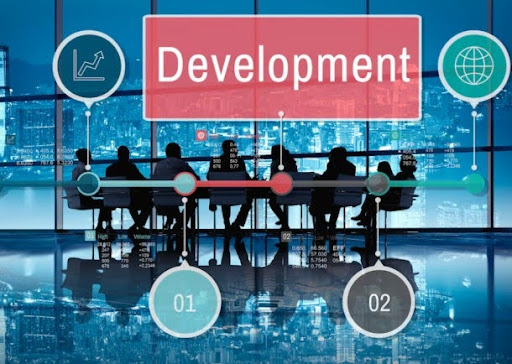In today's competitive marketplace, business development is more critical than ever. Whether you're a startup or an established enterprise, having a well-defined business strategy and development plan is essential for long-term success. But what exactly does business development entail, and how can you simplify the process to drive growth? This guide will walk you through the fundamentals of business development, offering practical tips and strategies tailored for both B2C and B2B business development scenarios. By the end of this guide, you'll have a clear roadmap for enhancing your business's growth trajectory.
Simplified Strategies for Effective Business Development
What is Business Development?

Business development is a multifaceted discipline that involves identifying growth opportunities, building strategic partnerships, and optimizing business processes. It’s not just about selling more products or services; it's about creating sustainable growth by understanding market needs, leveraging resources, and implementing effective strategies. Whether you're targeting consumers or other businesses, business development plays a crucial role in expanding your market reach and increasing profitability.
The Importance of a Clear Business Strategy
A successful business development plan starts with a well-thought-out business strategy and development framework. This strategy should outline your business's goals, target market, value proposition, and competitive advantage. Without a clear strategy, your efforts in business development can become scattered and ineffective.
-
Defining Your Goals
Before diving into business development, it's essential to define what success looks like for your business. Are you looking to expand into new markets? Increase sales with existing customers? Develop new products or services? Clear, measurable goals will guide your business development activities and ensure that every effort aligns with your overall business objectives.
-
Understanding Your Market
Successful business strategy and development requires a deep understanding of your target market. This includes knowing your customers' needs, preferences, and pain points. In B2B business development, it's also crucial to understand the industries you serve and the specific challenges faced by businesses in those sectors.
-
Creating a Value Proposition
Your value proposition is what sets you apart from the competition. It's a clear statement of the benefits your products or services offer and why customers should choose you over others. A strong value proposition is essential for effective business development, as it forms the foundation of your marketing and sales efforts.
-
Identifying Competitive Advantage
In any business strategy and development plan, it's important to identify your competitive advantage—what you do better than anyone else. This could be superior product quality, exceptional customer service, or innovative technology. Your competitive advantage will be a key driver in your business development efforts.
Simple Steps to Implement Business Development

Now that you have a clear business strategy and development framework, it's time to implement your business development plan. Here are some simple, actionable steps to get started:
Build Strategic Partnerships
One of the most effective ways to drive business development is by building strategic partnerships. These partnerships can help you access new markets, gain credibility, and share resources.
-
Identify Potential Partners
Look for businesses that complement your offerings. In B2B business development, potential partners could be suppliers, distributors, or even competitors.
-
Establish Mutual Goals
Successful partnerships are built on mutual benefit. Ensure that your goals align with those of your partners, and work together to achieve shared objectives.
-
Maintain Strong Relationships
Building a partnership is just the beginning. Maintaining strong, ongoing relationships is key to long-term success in business development.
Leverage Networking Opportunities
Networking is another critical component of business development. Whether it's attending industry events, joining professional organizations, or participating in online forums, networking can open doors to new opportunities.
-
Attend Industry Events
Industry conferences, trade shows, and seminars are great places to meet potential partners, customers, and influencers. In B2B business development, these events are especially valuable for connecting with decision-makers.
-
Join Professional Organizations
Membership in professional organizations can provide access to exclusive resources, networking events, and industry insights.
-
Participate in Online Forums
Online communities and social media platforms offer opportunities to connect with industry peers and potential clients, share knowledge, and build your brand.
Optimize Your Sales Process
An optimized sales process is essential for effective business development. Streamlining your sales process can help you close deals faster, improve customer satisfaction, and increase revenue.
-
Define Your Sales Funnel
A well-defined sales funnel outlines the steps a prospect takes from initial contact to purchase. In B2B business development, this might include lead generation, qualification, proposal, negotiation, and closing.
-
Use CRM Tools
Customer Relationship Management (CRM) tools can help you track leads, manage customer interactions, and automate follow-ups, making your sales process more efficient.
-
Train Your Sales Team
A knowledgeable and skilled sales team is crucial for converting leads into customers. Provide regular training on your products, services, and sales techniques to ensure your team is equipped to succeed.
Focus on Customer Retention
While acquiring new customers is important, retaining existing ones is equally crucial for business development. Repeat customers tend to spend more and are more likely to refer others to your business.
-
Deliver Exceptional Customer Service
Exceptional customer service is the cornerstone of customer retention. In B2B business development, where relationships are key, providing personalized, attentive service can set you apart from the competition.
-
Implement a Loyalty Program
Loyalty programs reward repeat customers and encourage them to continue doing business with you. This can be especially effective in both B2C and B2B business development contexts.
-
Solicit Feedback and Act on It
Regularly soliciting feedback from customers can help you identify areas for improvement and demonstrate that you value their input. Acting on this feedback can strengthen customer relationships and drive loyalty.
Measuring Success in Business Development
Measuring the success of your business development efforts is essential to ensuring that you're on the right track. Here are some key metrics to monitor:
-
Revenue Growth
Revenue growth is a direct indicator of the success of your business development activities. Track changes in revenue over time to assess the effectiveness of your strategies.
-
Customer Acquisition Cost (CAC)
CAC measures the cost of acquiring a new customer. A lower CAC indicates more efficient business development efforts.
-
Customer Lifetime Value (CLV)
CLV represents the total revenue you can expect from a customer over the duration of your relationship. A higher CLV indicates successful customer retention and business development.
-
Market Share
Market share reflects your business's position within the industry. An increasing market share suggests that your business development strategies are successfully expanding your market reach.
Conclusion
Business development doesn't have to be complicated. By following a clear business strategy and development framework, building strategic partnerships, leveraging networking opportunities, optimizing your sales process, and focusing on customer retention, you can simplify the process and drive sustainable growth. Whether you're engaged in B2C or B2B business development, these strategies will help you navigate the complexities of the business world and position your company for long-term success.
In summary, effective business development is about more than just closing deals; it's about building a solid foundation for growth. With the right approach, you can develop a streamlined business strategy and development plan that propels your business forward, ensuring that you stay competitive in today's dynamic marketplace.
